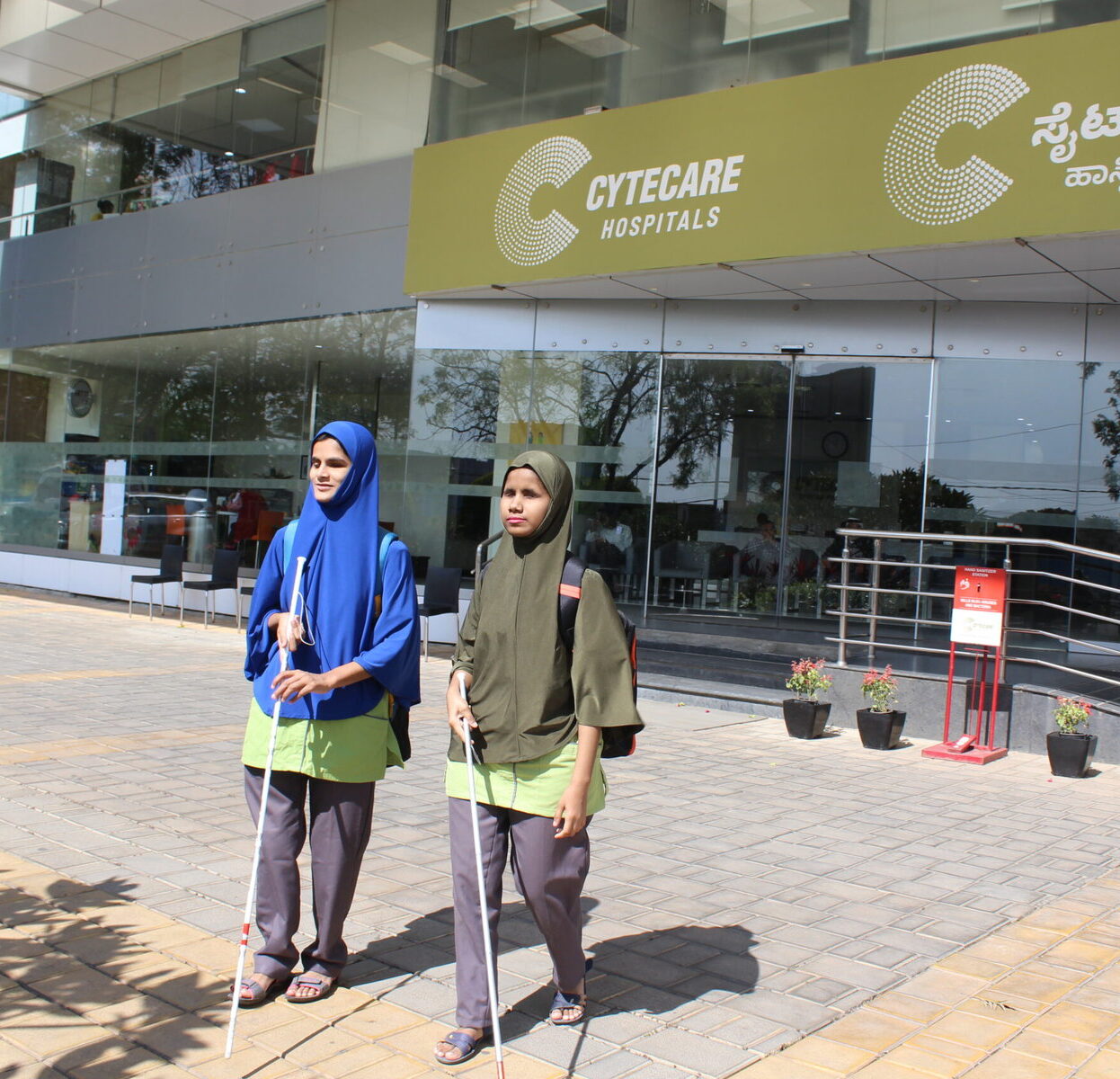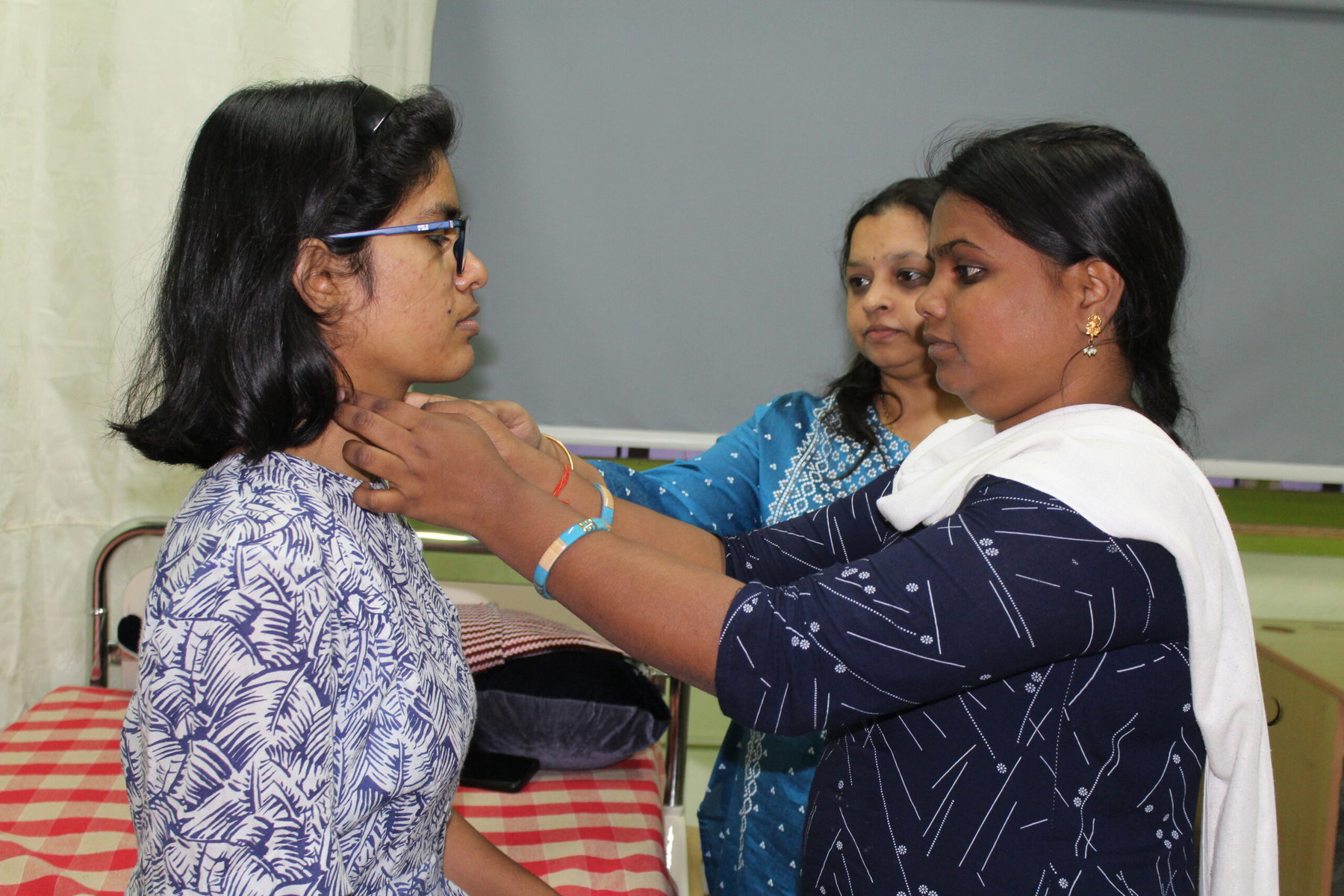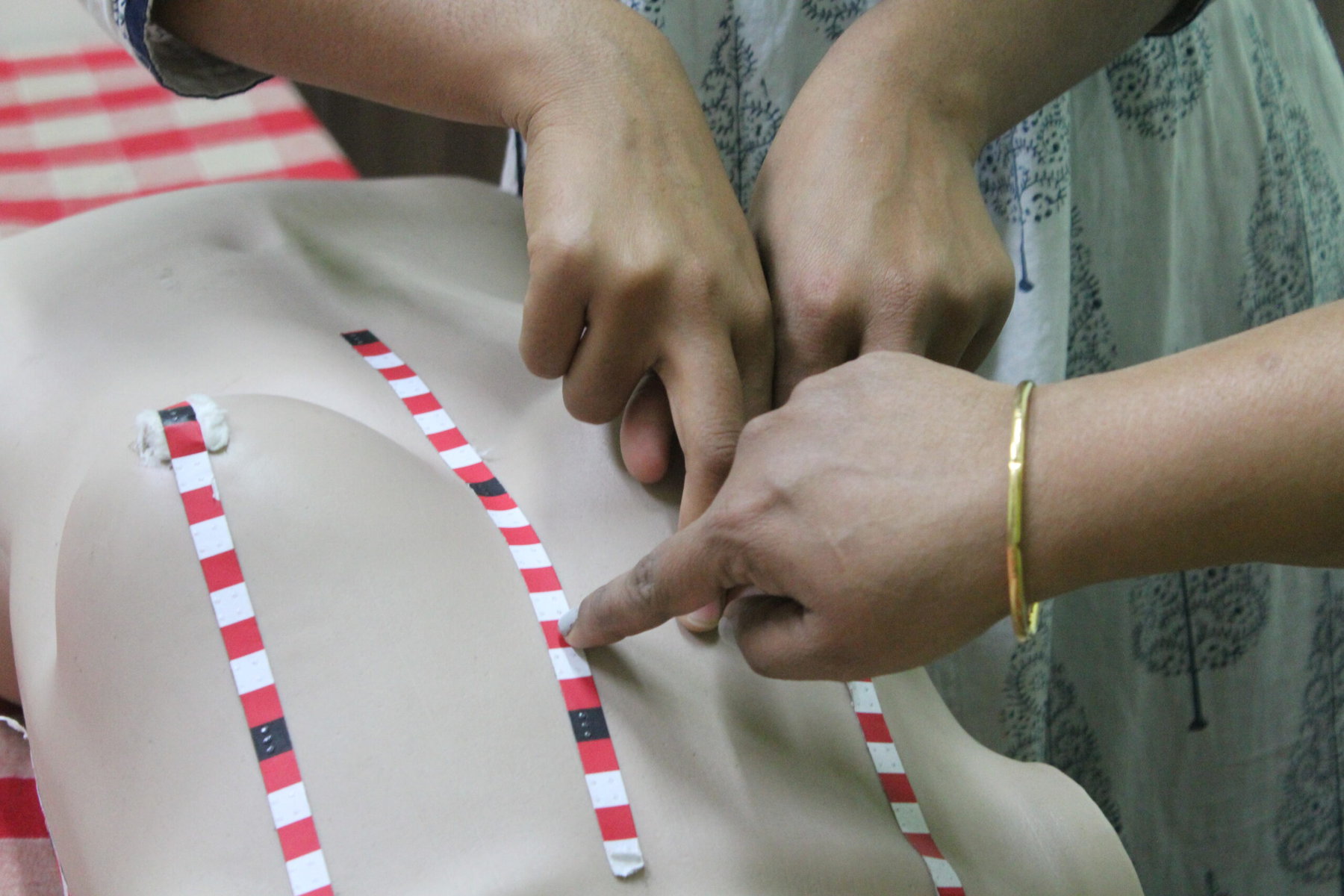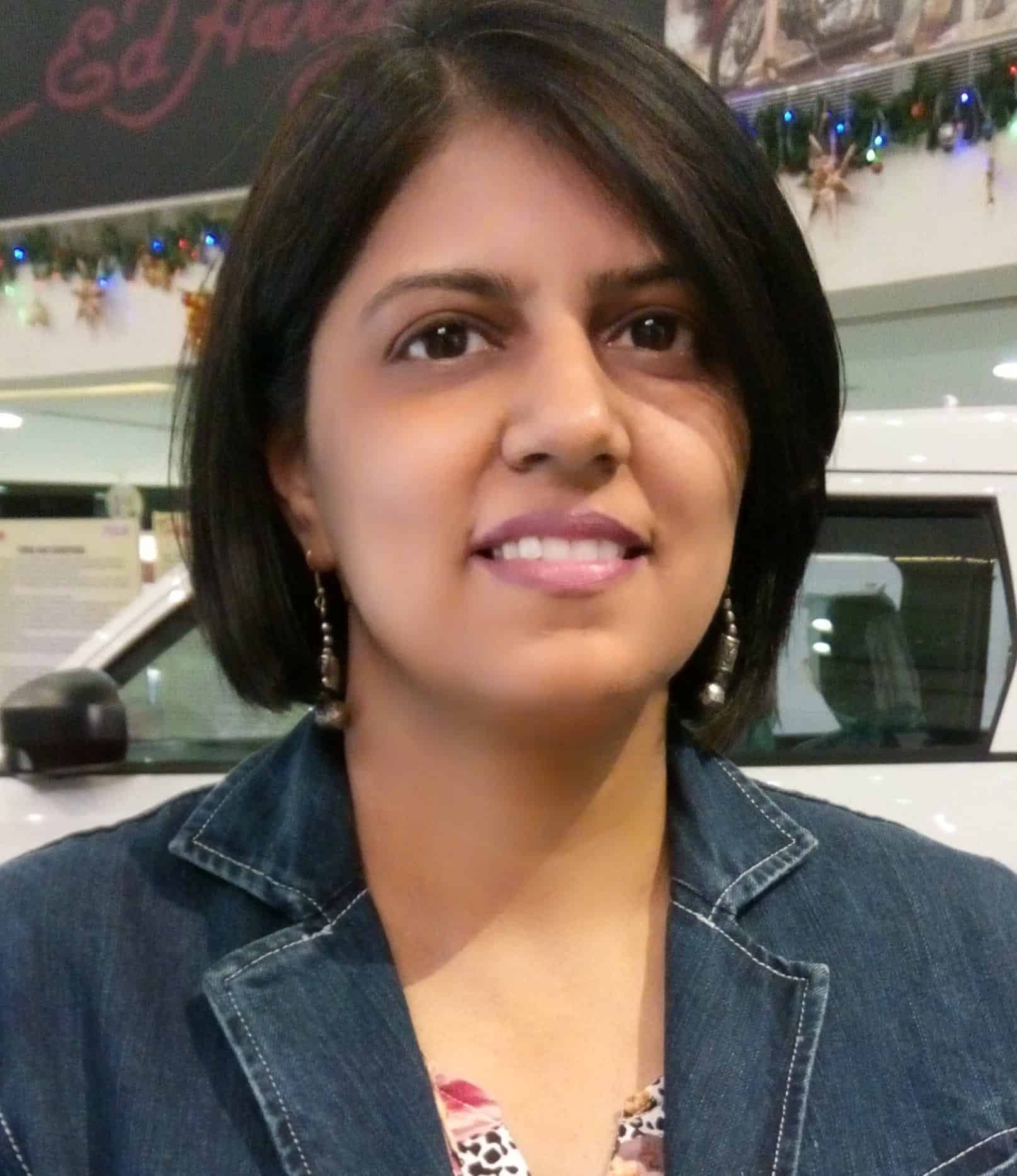On a sunny March morning in Bengaluru, Ayesha Banu and Noorunnisa walk up to the stage of Nitte Meenakshi Institute of Technology. Their white canes folded and held aside, they speak to a packed hall of students and teachers about their work as Medical Tactile Examiners (MTEs).
“We assist doctors in detecting the early signs of breast cancer in women,” Banu speaks into the mic. “Using the first two fingers of both hands, we examine women’s breasts for abnormalities.” She explains that blind women like herself and Noorunnisa are especially well-suited to this profession because of the “high tactile sense in our fingertips, which helps us find tiny lumps in the breast.”
Banu and Noorunnisa (who goes by one name) are based at Cytecare, a cancer hospital in Bengaluru. They often travel around India to raise awareness about the significance of early diagnosis of breast cancer and to conduct routine tactile breast examinations at workplaces, universities, NGOs, and most importantly, rural communities, where there is little access to healthcare.

Tactile breast examinations, or TBEs, are clinical breast examinations specially designed for blind women trained as MTEs. Breast cancer is the most commonly diagnosed cancer globally. It is the principal cause of death from cancer in India, primarily because 60 percent of the cases are diagnosed at stage III or IV of the disease — when survival rates dip drastically. Employing MTEs for routine breast cancer screening — and reaching women in their communities and workplaces — could help in the early detection of cancer and save lives, says Dr. Poovamma CU, the breast specialist under whom Banu and Noorunnisa work. In fact, preliminary research found that clinical breast exams performed by visually impaired MTEs have an accuracy level similar to exams performed by physicians.
To conduct the examination, an MTE pastes five purpose-built Braille-marked documentation tapes on a woman’s chest to divide it into four zones for orientation, and then palpates every centimeter to check for any abnormalities. After the 30- to 40-minute examination, the MTE documents her findings and emails them to a physician for diagnosis. At Cytecare, Dr. Poovamma CU evaluates each report and makes a call on whether the patient needs further assessment such as mammography or ultrasound examination.
Since 2018, 14 MTEs have examined about 6,000 women in India, despite a break of two and a half years during the pandemic.
A creative moment
The idea for MTEs came to the German gynecologist Dr. Frank Hoffmann, who offers early breast cancer screening to his patients in his clinic in Duisburg in western Germany.
“I wasn’t content with what I could offer my patients with my two- to three-minute clinical breast examinations,” he recalls. He says he was wary of missing small changes in the breast tissue, critical for catching the early signs of cancer, and was looking for solutions to bridge the gap.
Then, in November 2005, “during a very creative moment one morning when I was under a shower, it hit me that this could be the perfect job for visually impaired people because they have a very highly trained sense of touch,” he says. Studies prove that in the absence of sight, blind people’s brains can develop a heightened sense of touch, as well as hearing, along with other senses and cognitive functions.
Hoffmann reached out to Berufsförderungswerk, an NGO that trains blind and visually impaired people in vocational skills in Düren, and with their help, designed a nine-month training course including three months of internship. The training has been offered by Hoffmann’s social enterprise, Discovering Hands, since 2010, and has accredited nearly 100 MTEs in Germany, Colombia, Mexico, Nepal, Switzerland, Austria and India. (MTEs are currently only practicing in Europe and India; the program has been on hold in other countries since the MTEs lost their jobs during the pandemic.)
Discovering Hands was brought to India in 2017 by the Delhi-based nonprofit vocational training institute National Association of the Blind India Centre for Blind Women and Disability Studies (NABCBW) funded by the life sciences company Bayer, which continues to sponsor the training in Delhi. Seven MTEs were trained in Delhi’s inaugural cohort.

Two and a half years later, the NGO Enable India launched the training in Bengaluru. Banu and Noorunnisa were among the first cohort. Altogether, 18 MTEs have been trained in Delhi and Bengaluru, and eight more will graduate this year.
“Enable India works on shifting the narrative about persons with disabilities,” says Shanti Raghavan, the founder of the nonprofit. It aims to improve the recognition of persons with disabilities as meaningful contributors to society. Discovering Hands, Raghavan says, fulfills their mission because through the MTE training, “a woman with vision impairment is able to empower another woman, by offering her preventive health care.”
Becoming an MTE
Every year, applications for the new cohort are advertised with much enthusiasm through WhatsApp groups, other disability NGOs, and Enable Vaani, an audio-based social media platform for disabled people.
Candidates are assessed for five days and recruited on the basis of their tactile abilities, basic computer and English communication skills, and at least a 10th-grade pass certificate.
On a typical training day, the Discovering Hands training room at Enable India is abuzz with activity. Five blind and visually impaired women, ranging in age from 23 to 51, are busy learning. If one is cutting the documentation tapes to size, another may be pasting it on a 3D model of a woman’s breast. One may be trying to get a grasp on parts of the skin on a tactile model and yet another might be letting her screen reader read to her the lesson on types of cancers at a speech rate of 400 words per minute.
The training covers human — and specifically breast — anatomy and physiology and the study of cancers and palpation technique. It also includes the English communication and computer skills that are essential for an MTE to interact with her clients and upload medical histories and examination results.

None of the trainees had a chance to study science in school — when they were growing up, there was no option or provision for blind students for science education. Even today, science education is largely inaccessible to blind and visually impaired children in India because of a lack of special educators and schools that would be open to providing study material in diverse formats such as large print, Braille, audio, tactile, or digital.
“Initially, it was a little difficult for me to understand medical terminology,” says Leena Mehta, who lost her sight at 12 years old. But with consistent help and encouragement from her trainers, she got the hang of it. She adds that “3D models make it easy for us to understand how the human body works.”
Mehta knew she would face hurdles pursuing a medical curriculum, but she joined the training anyway. “I had never heard of a blind person working in the medical field,” she says, “and I wanted to be one.” She hasn’t regretted it.
“A lot of women who join the training have led protected lives at home,” says Ashwini Rao, a trainer at Enable India. Their parents often do not let them step out of the house, sometimes even at the cost of their education, she explains. Therefore, prior to the nine-month training, trainees are offered three months of mobility training, during which they learn to move independently from one place to another.
Trainees’ confidence catapults as they progress through the MTE training and gain skills and independence. Aishwarya Amalapuram, who has night blindness, says that she was previously unable to express herself, both because of shyness and lack of English communication skills, but now she can’t stop chattering.
Crushed by negative news?
Sign up for the Reasons to be Cheerful newsletter.Dr. Kanchan Kaur, a surgical oncologist who practices in Gurugram in North India and has been working with MTEs since 2018, says the training is very rigorous. “They get three months of internship in a very busy breast unit of a hospital under an oncologist, where they only learn about breast abnormalities – that’s much more time and practice than a medical student gets,” Kaur says.
In a recent Indian study where two MTEs conducted TBEs on 1,338 women, their success rate of detecting malignant cancers was over 78 percent, and the miss rate, only one percent.
What’s ahead
Physicians working with MTEs hope that the study will further establish MTEs as a useful resource for hospitals and screening programs and give a boost to the profession in India. Many medical facilities are hesitant to take on MTEs because of concerns that their disability could make them a logistical burden. Others don’t think they can get enough clients to pay for the examination.
Before expanding to other medical facilities, “we need to work on resource building,” says Kaur. Of the 18 trained MTEs in India, only six are actively practicing, while the rest have either opted for more secure government jobs or quit due to the pressures of married life or raising children.
Eight MTEs are due to graduate this year, though many more joined the training. Due to the length of the training, Rao says that some participants get restless and quit because they want to get a job as soon as possible. Many have switched to shorter courses on digital literacy. Shalini Khanna, the director of the NABCBW, notes that the price of training (it costs 2,50,000 INR, or $3,040, to train one MTE) has made it difficult to get funding for more women. The requirement of one trainer for every four to five trainees has also restricted the program’s expansion, since both the training centers have just two trainers each.
Those, like Banu, who graduate and move forward find the work fulfilling. “I get a lot of satisfaction from doing something for others,” Banu says. “I feel really happy when my clients give me so much respect for what I do for them.”
This project was funded by the European Journalism Centre, through the Global Health Security Call. This program is supported by the Bill & Melinda Gates Foundation.








